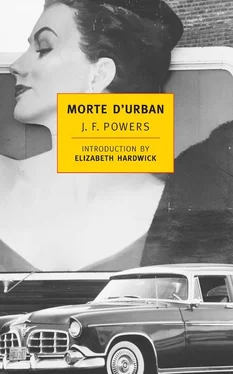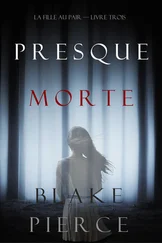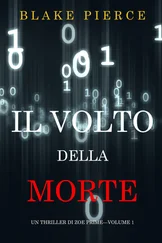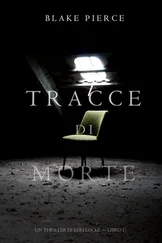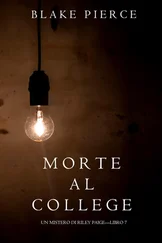“Probably wasn’t a whole lot anyway.”
“Let’s hope not,” said Father Urban, and wasn’t a bit annoyed with Wilf, for a change. A few hours away from Wilf and the Hill — a few hours spent with real people, in real places — had given him a lift.
Father Urban’s appearance before the Commercial Club made the front page of the Great Plains Record , a paper Wilf read. It was clear from the account that the speaker had been badgered about the crusade — that it had not figured in his talk — and yet Wilf, who was interested in making the Hill better known, and might have thanked Father Urban for doing so, said not a word. A few days later, the Farmer came out with a rather garbled version of the Record ’s story (the mute tumbler was described as a Clementine “fryer”), and still there was nothing from Wilf, no commendation, no comment.
Father Urban clipped both accounts and sent them to Billy Cosgrove — just for laughs, he said in his covering letter, although in truth he was rather pleased with his remarks and believed that Billy would be. “Clippings enjoyed here,” Billy responded at once, by card, which was the first communication Father Urban had received from him since arriving at the Hill. “And re your transfer, I’ll say that’s one hell of a way to run a railroad.”
Right as Billy was, Father Urban didn’t want the exchange to end on that note, and shot off a card: “St Paul tells us, ‘We know that to them that love God all things work together unto good.’ Just — Fr Urban.”
A couple of nights before Christmas, after the evening meal, Father Urban was the first one back in the refectory. Brother Harold was in the kitchen, Wilf was in the office, and Jack was in the chapel. Father Urban turned on the tree (which Wilf, doubtless, had been the one to turn off a few minutes earlier) and plugged in the nativity crib. Slowly, around and around the Holy Family, the oxen, sheep, and shepherds filed by, disappearing and reappearing in the wings, and out front the Three Kings bowed down, straightened up, and bowed down again. The crib had arrived that morning, a gift from Billy. There were many presents under the tree, most of them for Father Urban, and forwarded to him from the Novitiate where he usually spent the holidays, for few of his admirers knew of his new assignment. He hadn’t mentioned it on his Christmas cards (which, it would seem he’d mailed from some stopping-off place, as in other years). He might be back on the road where he belonged in another year, back at the Novitiate again, distributing the loot to those who otherwise got nothing at all for Christmas. This would be a bad year for some of the old men at the Novitiate. This year Jack, Wilf, and Brother Harold would all be wearing, eating, smoking, or otherwise using the stuff in the months ahead. Father Urban was grateful for whatever came his way, of course (one year he’d got seven electric razors), but when he thought of Billy he couldn’t help thinking that what might have been a mighty river flowing to the whole Order’s benefit had, through Father Boniface’s folly, been reduced to a trickle. A wicker hamper of food and liquor, and a nativity crib. Maybe the crib was a little like ducks in a shooting gallery, as Jack had said when he saw it work, but Father Urban rather liked it, and would say so. “Dear Billy…”
“Balsam,” said Wilf, entering the refectory. “You wouldn’t get that nice clean smell with spruce.”
“That’s right,” said Father Urban. He’d been lucky in the woods, it seemed, for he hadn’t known balsam from spruce. That morning, when Wilf had got out the little plastic tree he’d used the year before, Father Urban, saying nothing and acting on the old seminary principle of don’t-ask-if-you-can’t-take-no-for-an-answer, had gone for the ax. He’d returned from the woods with a seven-footer. “ Hey, what is this? ” Wilf had admitted, though, that the real tree made the plastic one look sick, had put it away, and surrendered the single cord of lights to Father Urban. Wilf had come off pretty well in the incident, showing that he — at least when he had no choice — could appreciate a right action.
“Cigar, Urban?”
“I’ve got one here somewhere.” Under the tree there was a box of cigars for Wilf — not what Father Urban would choose for himself but several cuts above what Wilf ordinarily smoked, and was now in the act of touching off.
“By rights, it should be in the chapel,” Wilf said, watching the crib. “It and the tree.”
Father Urban said nothing. He wanted the crib and tree to be where they could be enjoyed in comfort, and he believed that Wilf did, too, and would resolve his scruples without any help.
“One tree, though, wouldn’t be enough in the chapel.”
This would have been Father Urban’s first argument.
“Of course, if we had retreatants here now it would be different. We’d have to do something then.”
Retreatants at Christmastime? The trees were safe in the woods, and Wilf knew it.
“Little chilly in the chapel,” Wilf said, going over to his rocker. “I guess the good Lord will understand.”
Jack, looking as though he’d been outdoors, came in from the chapel and stood by the tree, rubbing his hands.
“All right,” said Father Urban, knowing what was expected of him.
Jack pulled the card table away from the wall, and Father Urban brought up two folding chairs, and thus began another evening of checkers.
On the first night, Wilf and Jack had played, but Wilf had lost every game and hadn’t played since. Perhaps he thought it looked bad for him to lose. If he spent the evening in the refectory, he just sat in his rocker and read the papers. If Father Urban offered him his place at the table, he said, “Thanks, but I have some office to say,” and then he’d continue with the papers. Why should it always be Father Urban and Jack? Why couldn’t Wilf share the burden? Why couldn’t Brother Harold? Even if Father Urban hadn’t discovered anything better to do with himself in the evening, he could get tired of checkers, couldn’t he? He didn’t like the game, and he wasn’t much good at it — although this was maybe the fault of the game. He wondered if its complexity might not be an illusion, if, in fact, there was much more to checkers than there was to ticktacktoe. The man who made the first move won the game, and the man who won got to make the first move in the next game. That might be all there was to checkers — that, and not making any mistakes. Jack made very few.
“Hey, take it easy!” said Father Urban when Jack’s right leg, which had a tendency to vibrate during play, suddenly shot out of control, jarring the table.
“Sorry,” Jack said. Now, though, he was on the move — inching forward on his chair, advancing behind his checkers on the board. Suddenly his respiration dropped to normal, and he sat back.
Usually, when Jack did this, it meant that the turning point in the battle had passed. But had it? Father Urban made one of his unorthodox moves, after which it became clear to him that the decisive action had taken place in another sector. They played out the game, though, and once more Father Urban lost — gracefully, as Wilf hadn’t. Why not? It was just a game, wasn’t it? And what else was Jack good at? It came down to checkers for him. Poor Jack. Of course, his spiritual life was good.
Jack set up the board for another. “What do you know about chess?” he asked.
“I doubt that you’d be so good at chess,” said Father Urban, thinking he’d probably be better at that. “I’ve never played it, though.”
“Chess is a very ancient game,” Wilf informed them from his rocker.
Father Urban glanced over in Wilf’s direction and sniffed. The pity was that a remark like that was actually meant to be instructive. It showed what Wilf thought of them.
Читать дальше
